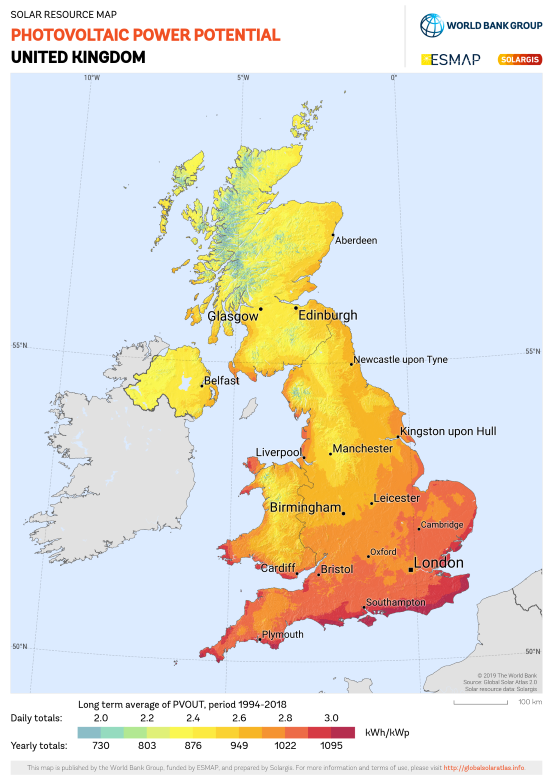
From Scotland to the South Coast: Could Solar Benefit Your Business?
OPINION | By Daniel Levene, Co-founder, Two Blues Solar > Whether you’re a sun worshipper or you can’t stand the heat, you’ve probably wondered at some stage how much your business could save on energy bills and carbon emissions if you had solar on the roof.
For despite the well-established nature of solar technology and its exponential growth over the past 10-15 years, it still remains under-developed in the UK. Only 5% of the UK’s warehouse rooftops currently have solar installed.
There’s clearly a huge untapped potential to contribute to both individual businesses’ net zero goals as well as the UK’s wider targets.
Understandably, in order to justify investment in renewable generation, most businesses need to ensure it will be commercially sustainable. Fortunately it makes complete sense to invest in solar as it is currently the cheapest source of electricity available. Added to that, rooftop solar offers one of the quickest means of generating on-site renewable energy. If the system size is below the planning threshold of 1MWp, it will likely take only c. 6-7 months from application to “go live”.
So what holds businesses back? As with most sustainability initiatives, there’s no single answer to that question. It might be due to time, resource or capital constraints or simply a lack of awareness of the options available and the benefits that can be accessed. As a result, solar often gets put in the “too difficult” or “not right now” or “it won’t work for my business” bucket.
And it’s true that solar may not work for everyone. If for example you’re a logistics business looking to roll out electric vehicles and support your increased energy consumption with solar, you might find that your operating profile (if you’re charging at night) doesn’t match the output profile of solar particularly well. Whilst battery storage should help solve this mismatch in the long-term, solutions are currently very expensive. However, if you’re a manufacturing business operating mainly daytime hours, and you’ve seen your energy bills rise significantly, solar is likely to offer an excellent means of accessing cost and carbon savings.
So to give you an idea of how solar could benefit businesses, we’ve modelled five identical 20,000 sq ft steel framed commercial warehouses across different UK locations.
We’ve assumed that all the sites have north / south facing, 8.5 degree pitched roofs and are using the same high-quality equipment. We’ve also assumed that the whole roof is covered by panels and that all the energy produced is consumed by the building.
The locations (Glasgow, Manchester, Birmingham, London and Eastbourne) were chosen based upon the general bands of UK solar irradiance in the SolarGIS diagram RS1 below.

We explored the carbon and energy cost savings that could be offered to these warehouses if the systems were funded through a Power Purchase Agreement (PPA).
A PPA is a means of financing solar that allows a business (a tenant, landlord or owner occupier) to install solar without any upfront capital.
The PPA provider funds 100% of the installation and ongoing maintenance costs. They then sell the solar energy back to the business. The contractual terms for the sale of this energy are laid out in a Power Purchase Agreement. The price of the energy is typically considerably lower than the market price businesses will pay to their energy supplier.
To calculate the potential cost savings, we assumed a market energy price of 30 p/ kWh in comparison to a PPA price of 13 p/kWh.
| Eastbourne | London | Birmingham | Manchester | Glasgow | |
| Annual Saving | £60,463 | £54,323 | £51,466 | £49,162 | £48,544 |
| June Saving | £9,432 | £8,474 | £8,028 | £7,669 | £7,572 |
| Annual Carbon Emission Saving | 37.34 | 33.19 | 31.32t | 30.32 | 30.06 |
| Equivalent Trees Planted | 1,715 | 1,525 | 1,439 | 1,392 | 1,380 |
Unsurprisingly, more energy and savings are produced in locations where the solar irradiance is higher. Yet regardless of location, the savings provided in each case are significant. These sites could have generated over £8,000 of energy savings and 2.7t in carbon savings in one month alone this summer. For a huge number of businesses, solar will make commercial and environmental sense. It’s time to move solar to the “action now” bucket!
We’ve put together a number of articles and video resources to help businesses understand more about the process of implementing solar.
- See all recent Climate Perspectives editions here.
Two Blues Solar provides fully-funded solar via a PPA to energy-intensive businesses. Find out more on our website or get in touch at info@twobluessolar.com.
We’re also delighted to be a sponsor of the UK’s national awareness week, Energy Security and Green Infrastructure Week, 6-10 November. As part of the week’s online conference, we’ll be hosting a live webinar aimed at anyone considering installing on-site solar for their business. If you’d like to find out more, register for our webinar here.